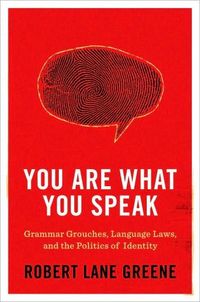

Purchase
Grammar Grouches, Language Laws, and the Politics of Identity
Random House Publishing Group
March 2011
On Sale: March 8, 2011
304 pages
ISBN: 0553807870
EAN: 9780553807875
Hardcover
Add to Wish List
Self-Help
What is it about other people’s language that moves some of
us to anxiety or even rage? For centuries, sticklers the
world over have donned the cloak of authority to control the
way people use words. Now this sensational new book strikes
back to defend the fascinating, real-life diversity of this
most basic human faculty. With the erudite yet accessible style that marks his work as
a journalist, Robert Lane Greene takes readers on a
rollicking tour around the world, illustrating with vivid
anecdotes the role language beliefs play in shaping our
identities, for good and ill. Beginning with literal myths,
from the Tower of Babel to the bloody origins of the word
“shibboleth,” Greene shows how language “experts” went from
myth-making to rule-making and from building cohesive
communities to building modern nations. From the notion of
one language’s superiority to the common perception that
phrases like “It’s me” are “bad English,” linguistic beliefs
too often define “us” and distance “them,” supporting class,
ethnic, or national prejudices. In short: What we hear about
language is often really about the politics of identity. Governments foolishly try to police language development
(the French Academy), nationalism leads to the violent
suppression of minority languages (Kurdish and Basque), and
even Americans fear that the most successful language in
world history (English) may be threatened by increased
immigration. These false language beliefs are often tied to
harmful political ends and can lead to the violation of
basic human rights. Conversely, political involvement in
language can sometimes prove beneficial, as with the Zionist
revival of Hebrew or our present-day efforts to provide
education in foreign languages essential to business,
diplomacy, and intelligence. And yes, standardized languages
play a crucial role in uniting modern societies. As this fascinating book shows, everything we’ve been taught
to think about language may not be wrong—but it is often
about something more than language alone. You Are What You
Speak will certainly get people talking.
Comments
No comments posted.
Registered users may leave comments.
Log in or register now!
| 


 © 2003-2025 off-the-edge.net
all rights reserved Privacy Policy
© 2003-2025 off-the-edge.net
all rights reserved Privacy Policy